
CONVENTIONON THE SIMPLIFICATION OF FORMALITIES IN TRADE IN GOODS("Off. Herald of RS - Treaties", No. 13/2015) |
THE EUROPEAN ECONOMIC COMMUNITY,
(hereinafter called the Community),
AND THE REPUBLIC OF AUSTRIA, THE REPUBLIC OF FINLAND, THE REPUBLIC OF ICELAND, THE KINGDOM OF NORWAY, THE KINGDOM OF SWEDEN AND THE SWISS CONFEDERATION
(hereinafter called the EFTA countries)
CONSIDERING the Free Trade Agreements between the Community and each of the EFTA countries;
CONSIDERING the Joint Declaration calling for the creation of a European economic space, adopted by Ministers of the EFTA countries and the Member States of the Community and the Commission of the European Communities in Luxembourg on 9 April 1984, especially with regard to simplification of border formalities and rules of origin;
CONSIDERING that, in the framework of action to strengthen the internal market, the Community has decided to introduce a single administrative document for use in such trade from 1 January 1988;
CONSIDERING it appropriate to simplify also formalities in trade in goods between the Community and the EFTA countries as well as between the EFTA countries themselves, in particular by introducing a single administrative document;
CONSIDERING that no provision of this Convention may be interpreted as exempting the Contracting Parties from their obligations under other international agreements,
HAVE DECIDED TO CONCLUDE THE FOLLOWING CONVENTION
Article 1
[1. This Convention lays down the measures to simplify formalities in trade in goods between the Contracting Parties, in particular by introducing a single administrative document (hereinafter referred to as the single document) to be used for any procedure at export and import and for a common transit procedure (hereinafter referred to as transit), applicable to trade between the Contracting Parties regardless of the kind and origin of the goods.
2. For the purposes of this Convention, "third country" shall mean any country which is not a Contracting Party to this Convention.
3. From the date on which the accession of a new Contracting Party becomes effective in accordance with Article 11a, all references in this Convention to EFTA countries shall apply to that country mutatis mutandis, and solely for the purposes of this Convention.]3
--------
3 Recommendation Nr 1/93 of the EEC-EFTA Joint Committee on the simplification of formalities in trade in goods of 23 September 1993 for the amendment of the Convention of 20 May 1987. on the simplification of formalities in trade in goods Official Journal L 036 , 14/02/1996 p. 0027 - 0028
Article 2
Where goods are the subject of trade between the Contracting Parties, the formalities connected with such trade shall be completed using a single document based on a declaration form, the specimens of which are to be found in Annex I to this Convention. The single document shall, depending on the circumstances, serve as a declaration or document of export, transit or import.
Article 3
Administrative documents may be required by a Contracting Party in addition to the single document only where:
- expressly required for the implementation of a legislation in force in a Contracting Party for which the use of the single document would not suffice;
- required under the terms of international agreements to which it is a party;
- required from operators to enable them to qualify, at their request, for an advantage or a specific facility.
Article 4
1. Nothing in this Convention shall preclude the Contracting Parties from applying simplified procedures, whether or not based on the use of computers, with a view to greater simplification for operators.
2. Simplified procedures may, in particular, consist in allowing operators not to have to present to a customs office either the goods in question or the declaration relating to them, or in allowing them to draw up an incomplete declaration. In such cases, a declaration, which, if the competent authorities agree, may be a general periodic declaration, must be submitted subsequently within the time-limits laid down by those authorities.
In the cases referred to in paragraph 1, operators may be authorized to use commercial documents in the place of the single document.
Where the single document is used, the persons concerned may, on authorization by the competent authorities, attach to it commercial schedules describing the goods in lieu of continuation sheets of the single document for the purpose of completing formalities for any procedure at export and import.
3. Nothing in this Convention shall preclude the Contracting Parties from:
- dispensing with the single document with regard to postal traffic (by letter or parcel post);
- dispensing with the requirement of written declarations;
- concluding between themselves agreements or arrangements with a view to greater simplification of formalities in all or part of the trade between them;
- allowing the use of loading lists for the completion of transit formalities in the case of consignments composed of several kinds of goods, in lieu of continuation sheets of the single document;
- allowing declarations to be made, where appropriate on plain paper, by means of public or private computers on conditions fixed by the competent authorities;
- enabling the competent authorities to require that data necessary for completing the formalities in question be entered in their computerized declaration-processing systems without, where appropriate, requiring a written declaration;
- enabling the competent authorities, should a computerized declaration-processing system be used, to provide that the export, transit or import declaration be constituted either by the single document produced by that system or by entry of the data in the computer if such a document is not produced;
- applying any facility adopted by way of a decision of the Joint Committee, as referred to in Article 11 (3).
Article 5
1. Provisions on the completion, by means of the single document, of the formalities needed for the export, transit and import of the goods are laid down in Annex II to this Convention.
2. The common codes to be used in the forms laid down in Annex I are to be found in Annex III to this Convention.
Article 6
1. The declaration must be completed in one of the official languages of the Contracting Parties which is acceptable to the competent authorities of the country in which the export or transit formalities are completed. Where necessary, the customs authority of the country of destination or of transit may require from the declarant or his representative in that country a translation of the said declaration into the official language or one of the official languages of that country.
2. By way of derogation from paragraph 1, the declaration shall be completed in one of the official languages of the country of import in all cases where the declaration in that country is made on copies of the declaration from other than those presented to the customs authorities of the country of export or departure.
Article 7
1. The declarant or his representative may, for each stage of an operation involving trade in goods between Contracting Parties, use the copies of the declaration necessary for completion of the formalities relating to that stage alone, to which may be attached, where appropriate, the copies necessary for completion of the formalities relating to one or other of the subsequent stages of that operation.
2. The benefit of the provisions of paragraph 1 shall not be subject to compliance with any special condition imposed by the competent authorities.
However, without prejudice to specific provisions concerning groupage traffic, the competent authorities may lay down that formalities relating to export and transit operations should be completed on the same form by means of copies corresponding to these formalities.
Article 8
In the cases referred to in Article 7, the competent authorities shall, to the extent possible, satisfy themselves that the particulars given in the copies of the declaration drawn up in the course of the various stages of the operation in question all agree.
Article 9
1. In order to ensure the smooth functioning of trade between the Contracting Parties and to facilitate the detection of any irregularity or infringement, the customs authorities of the countries concerned shall, upon request or, where they consider that this would be in the interest of another Contracting Party, on their own initiative, provide each other with all available information (including administrative reports and findings) of interest for the proper implementation of this Convention.
2. Assistance may be withheld or denied, totally or partly, when the requested country considers that the assistance would be prejudicial to its security, public policy (ordre public) or other essential interests, or would violate an industrial, commercial or professional secret.
3. If assistance is withheld or denied, the decision and the reasons therefor must be notified to the requesting country without delay.
4. If the customs authority of a country requests assistance which it would not be able to give if requested, it shall draw attention to that fact in the request. Compliance with such a request shall be at the discretion of the customs authority to whom the request is made.
5. Information obtained in accordance with paragraph 1 shall be used solely for the purposes of this Convention and shall be accorded the same protection by a receiving country as is afforded to information of like nature under the national law of that country. Such information may be used for other purposes only with the written consent of the customs authority which furnished them and subject to any restrictions laid down by that authority.
Article 10
1. A Joint Committee is hereby established in which each Contracting Party to this Convention shall be represented.
2. The Joint Committee shall act by mutual agreement.
3. The Joint Committee shall meet whenever necessary but at least once a year. Any Contracting Party may request that a meeting be held.
4. The Joint Committee shall adopt its own rules of procedure which shall contain, inter alia, provisions for convening meetings and for the designation of the Chairman and his term of office.
5. The Joint Committee may decide to set up any Sub-Committee or Working Party that can assist it in carrying out its duties.
Article 11
1. It shall be the responsibility of the Joint Committee to administer this Convention and ensure its proper implementation. For this purpose, the said Committee shall be kept regularly informed, by the Contracting Parties, of the experiences gained from application of the Convention, shall make recommendations, and, in the cases provided for in paragraph 3, shall take decisions.
2. In particular, the Joint Committee shall recommend:
(a) amendments to this Convention;
(b) any other measure required for its application.
[3. The Joint Committee shall adopt, by decision, amendments to the Annexes to this Convention, facilities referred to in the last indent of Article 4 (3) and invitations to third countries within the meaning of Article 1 (2) to accede to this Convention in accordance with Article 11a. Such decisions, except invitations to third countries, shall be put into effect by the contracting parties in accordance with their own legislation.] 4
4. If a Contracting Party’s representative in the Joint Committee has accepted a decision subject to the fulfilment of constitutional requirements, the decision shall enter into force, if no date is contained therein, on the first day of the second month following notification that the reservation has been lifted.
[5. Decisions of the Joint Committee referred to in paragraph 3 inviting a third country to accede to this Convention shall be sent to the General Secretariat of the Council of the European Communities, which shall communicate it to the third country concerned, together with a text of the Convention in force on that date.
6. From the date referred to in paragraph 5, the third country concerned may be represented on the Joint Committee and working parties by observers.] 5
-----------
4 Recommendation Nr 1/93
5 Recommendation Nr 1/93
Article 11a
1. Any third country may become a Contracting Party to this Convention if invited to do so by the depositary of the Convention following a decision of the Joint Committee.
2. A third country invited to become a Contracting Party to this Convention shall do so by lodging an instrument of accession with the General Secretariat of the Council of the European Communities. The said instrument shall be accompanied by a translation of the Convention into the official language(s) of the acceding country.
3. The accession shall become effective on the first day of the second month following the lodging of the instrument of accession.
4. The depositary shall notify all Contracting Parties of the date on which the instrument of accession was lodged and the date on which the accession will become effective.
5. Recommendations and decisions of the Joint Committee referred to in Article 11 (2) and (3) adopted between the date referred to in paragraph 1 of this Article and the date on which accession becomes effective shall also be communicated to the invited third country via the General Secretariat of the Council of the European Communities.
A declaration accepting such acts shall be inserted either in the instrument of accession or in a separate instrument lodged with the General Secretariat of the Council of the European Communities within six months of the communication. If the declaration is not lodged within that period the accession shall be considered void.] 6
---------
6 Recommendation Nr 1/93
Article 12
Each Contracting Party shall take appropriate measures to ensure that the provisions of this Convention are effectively and harmoniously applied taking into account the need to reduce as far as possible the formalities imposed on trade and the need to achieve mutually satisfactory solutions of any difficulties arising out of the operation of those provisions.
Article 13
The Contracting Parties shall keep each other informed of the provisions which they adopt for the implementation of this Convention.
Article 14
The Annexes to this Convention shall form an integral part thereof.
Article 15
1. This Convention shall apply, on the one hand, to the territories in which the Treaty establishing the European Economic Community is applied and under the conditions laid down in that Treaty and, on the other hand, to the territories of the EFTA countries.
2. This Convention shall also apply to the Principality of Lichtenstein for as long as that Principality remains bound to the Swiss Confederation by a customs union treaty.
Article 16
Any Contracting Party may withdraw from this Convention provided it gives twelve months’ notice in writing to the depositary referred to in Article 17 which shall notify all other Contracting Parties.
Article 17
1. This Convention shall enter into force on 1. January 1988, provided that, before 1 November 1987, the Contracting Parties have deposited their instruments of acceptance with the General Secretariat of the Council of the European Communities, which shall act as depositary.
2. If this Convention does not enter into force on 1 January 1988, it shall do so on the first day of the second month following the deposit of the last instrument of acceptance.
3. The depositary shall notify the Contracting Parties of the date of the deposit of the instrument of acceptance of each Contracting Party and of the date of the entry into force of the Convention.
Article 18
This Convention, drawn up in a single original of the Danish, Dutch, English, Finnish, French, German, Greek, Icelandic, Italian, Norwegian, Portuguese, Spanish and Swedish languages, all texts being equally authentic, shall be deposited in the archives of the General Secretariat of the Council of the European Communities, which shall transmit a certified copy thereof to each Contracting Party.
[Done at Interlaken, the 20 may 1987.] 7
-------------
7 Is not part of the text officially published in the O.J
SPECIMENS REFERRED TO IN ARTICLE 2 OF THE CONVENTION 8
This Annex contains at:
- appendix 1: the specimen single document form referred to in paragraph 1 (a) of Article 1 of Annex II,
- appendix 2: the specimen single document form referred to in paragraph 1 (b) of Article 1 of Annex II,
- appendix 3: the specimen continuation sheet form referred to in paragraph 2 (a) of Article 1 of Annex II,
and
- appendix 4: the specimen continuation sheet form referred to in paragraph 2 (b) of Article 1 of Annex II.
-------------
8 In all the forms in this Annex, either the words "Community transit" or the words "common transit" may be used.

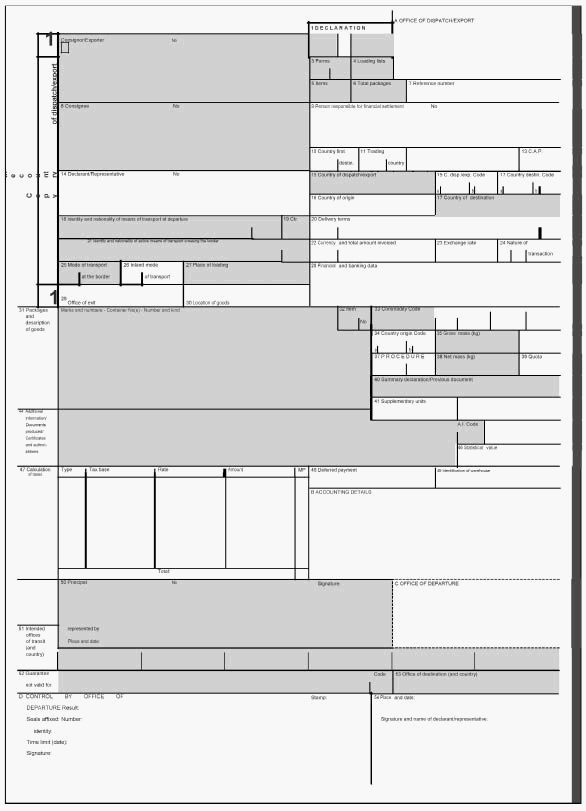
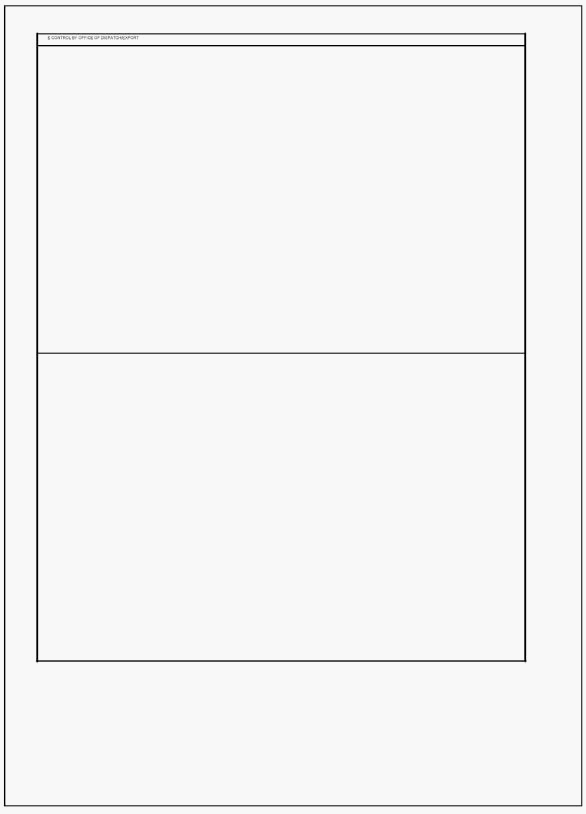
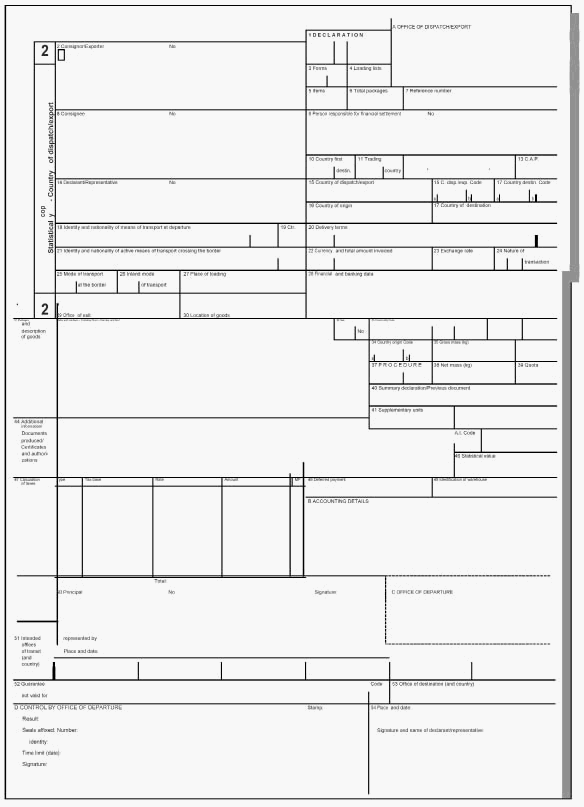
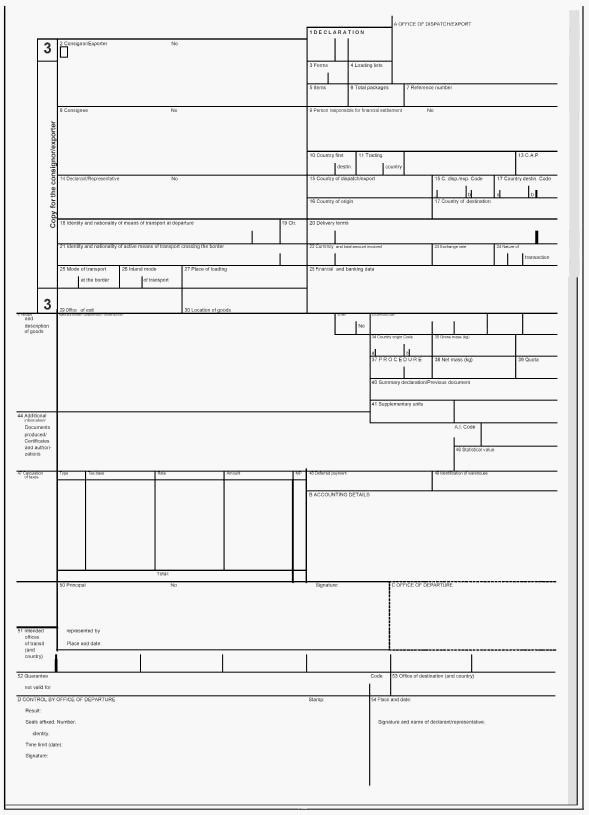
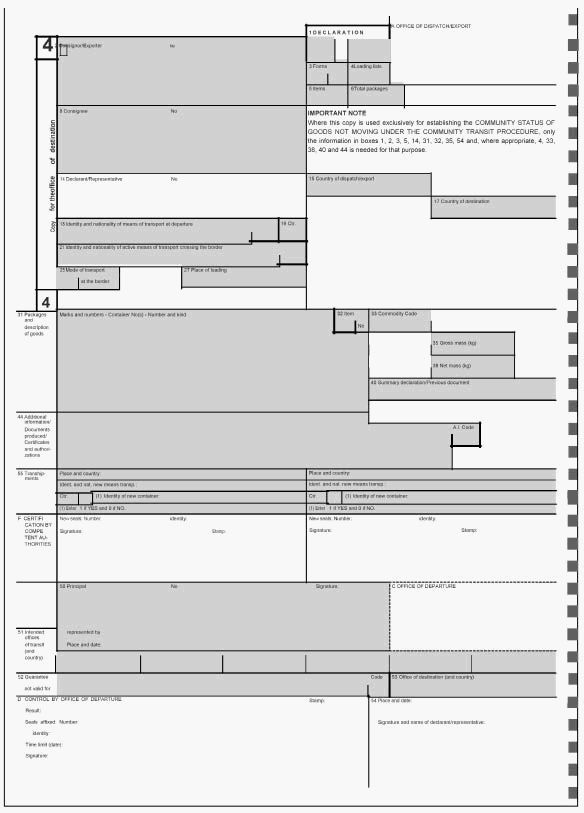


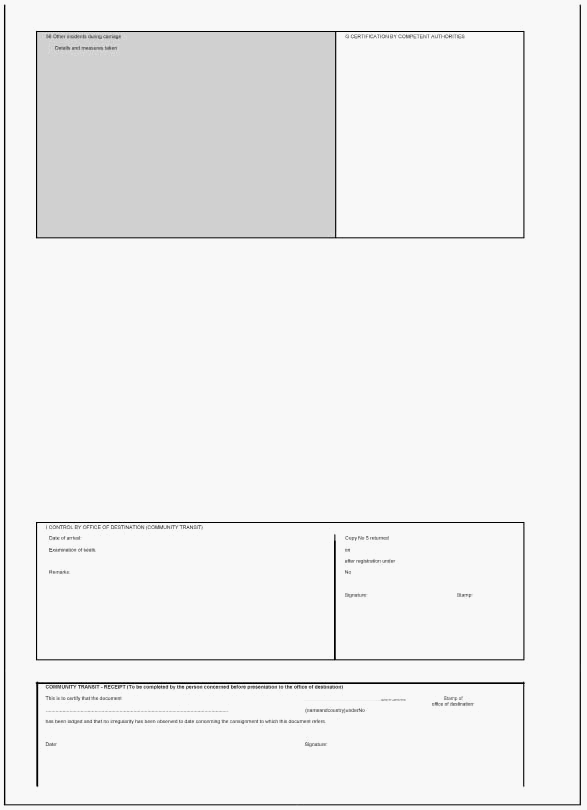
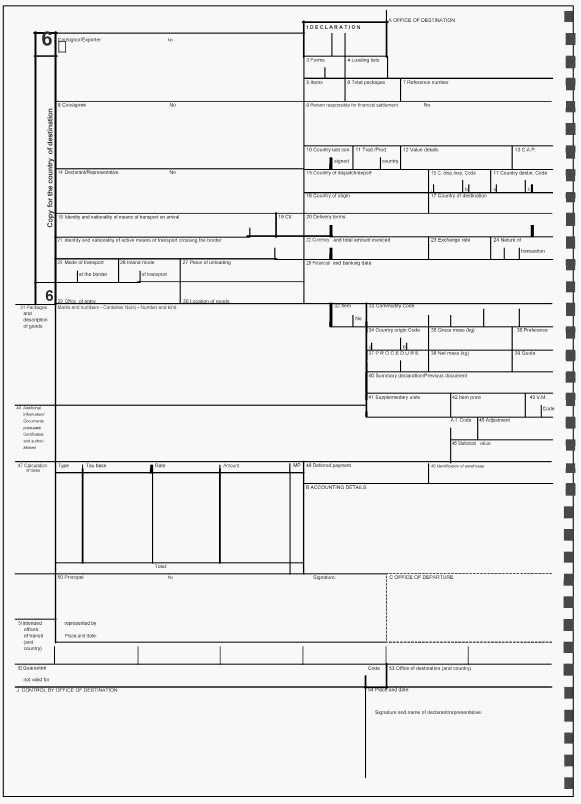
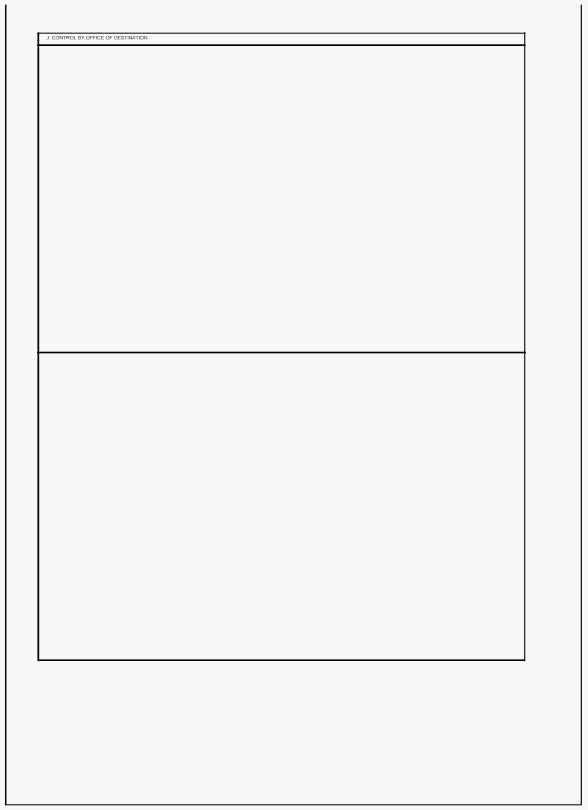
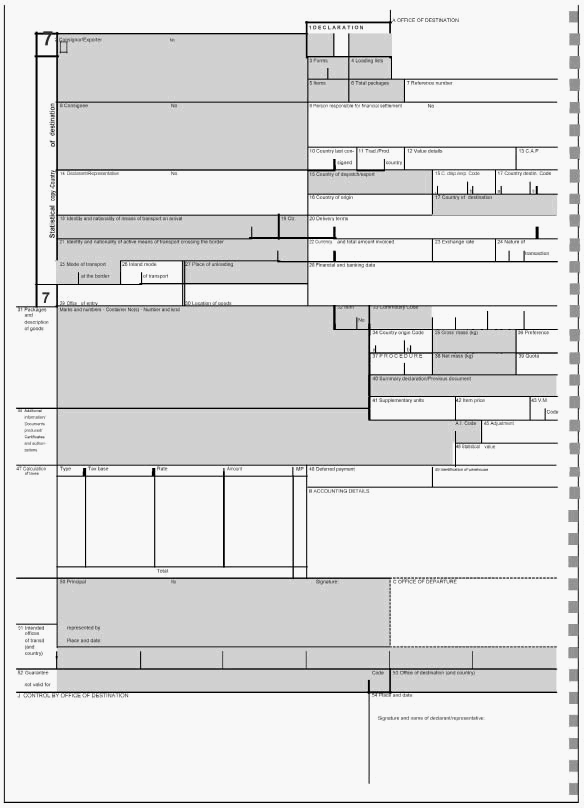
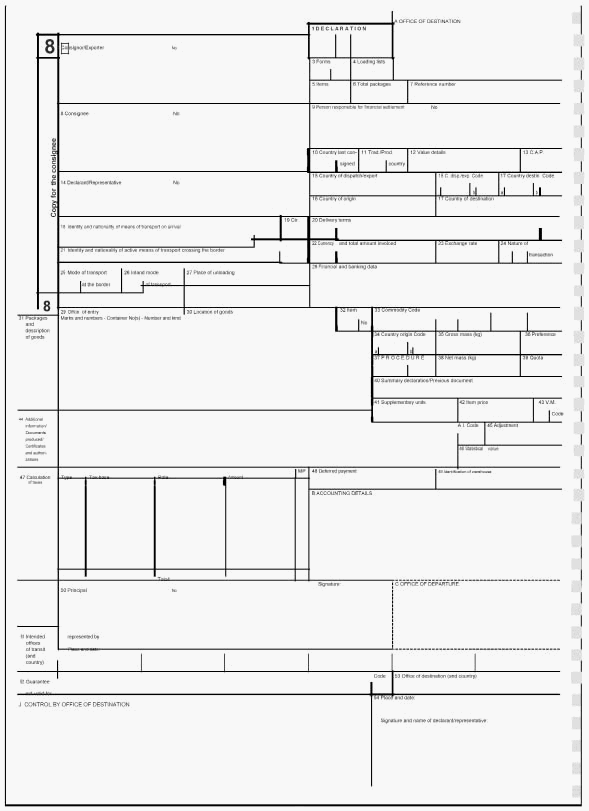


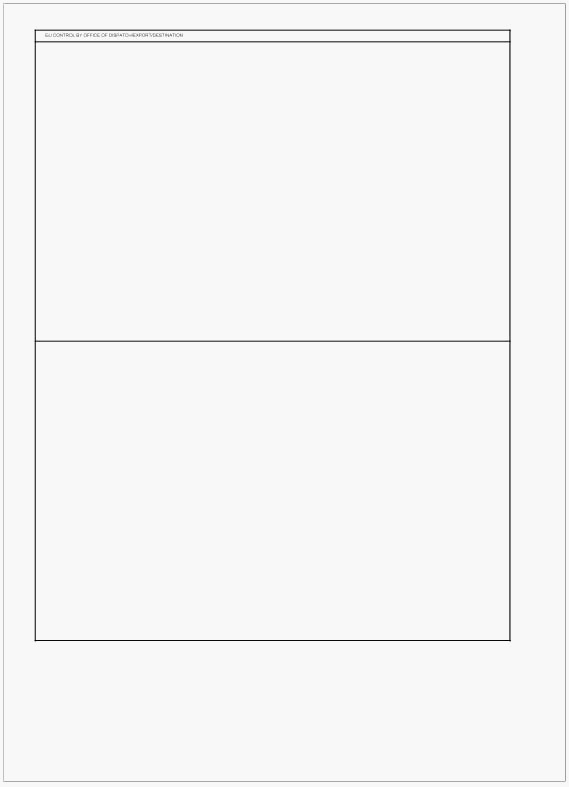
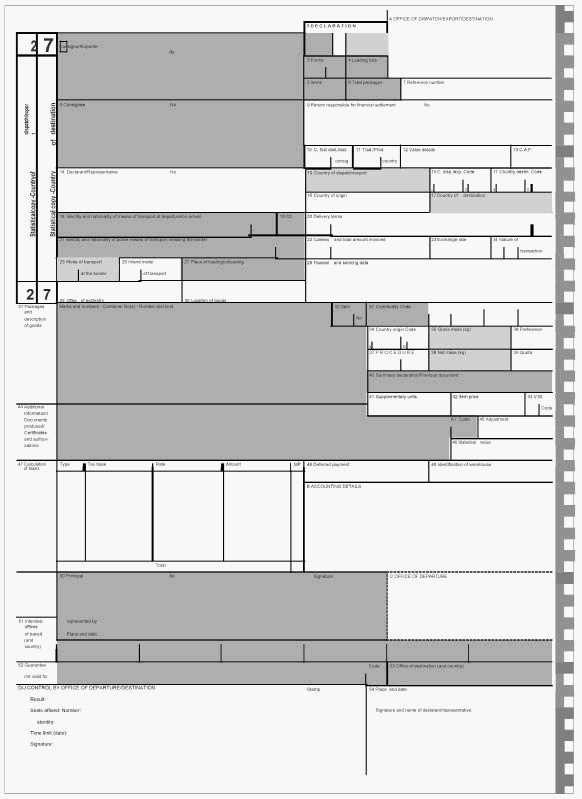
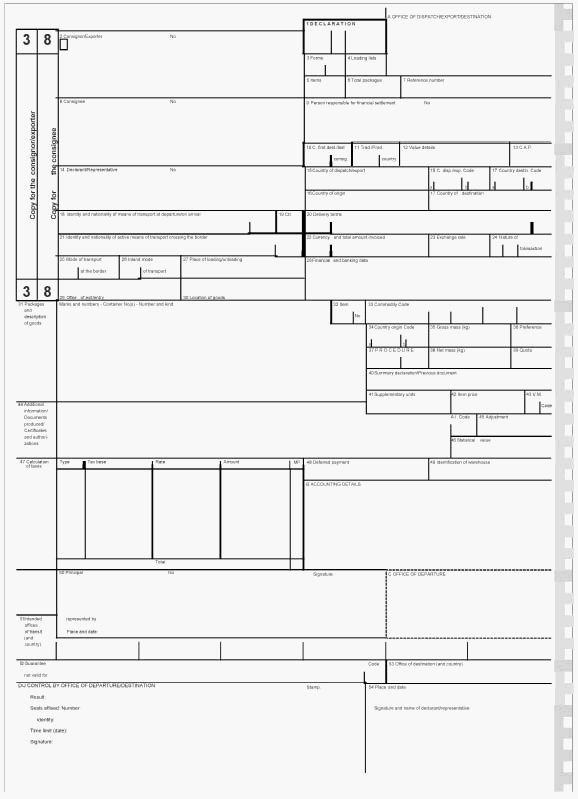
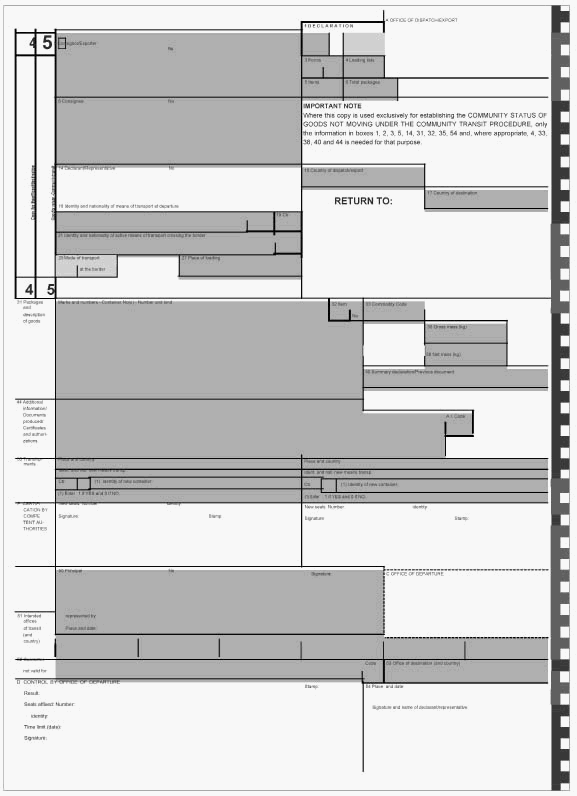



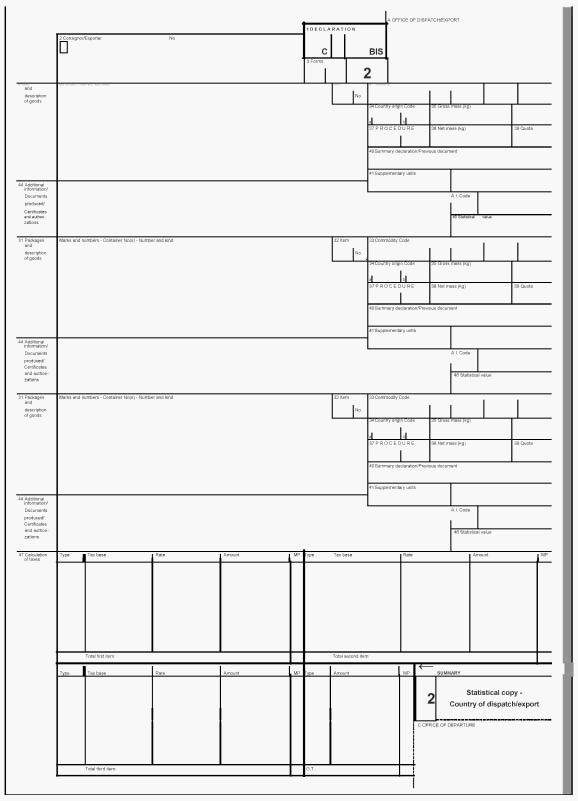
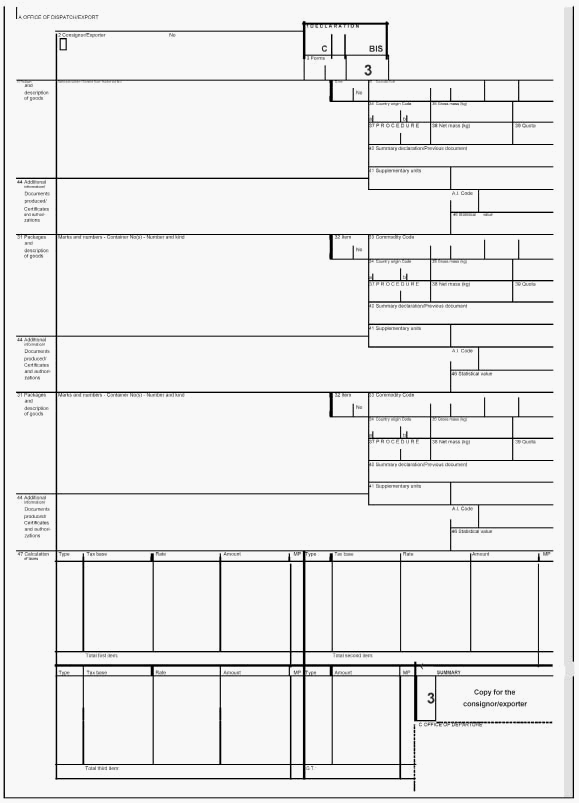
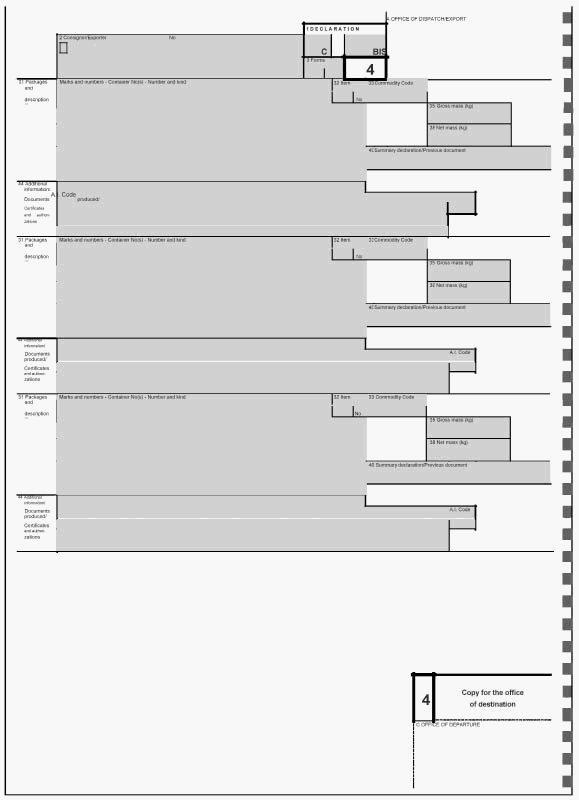
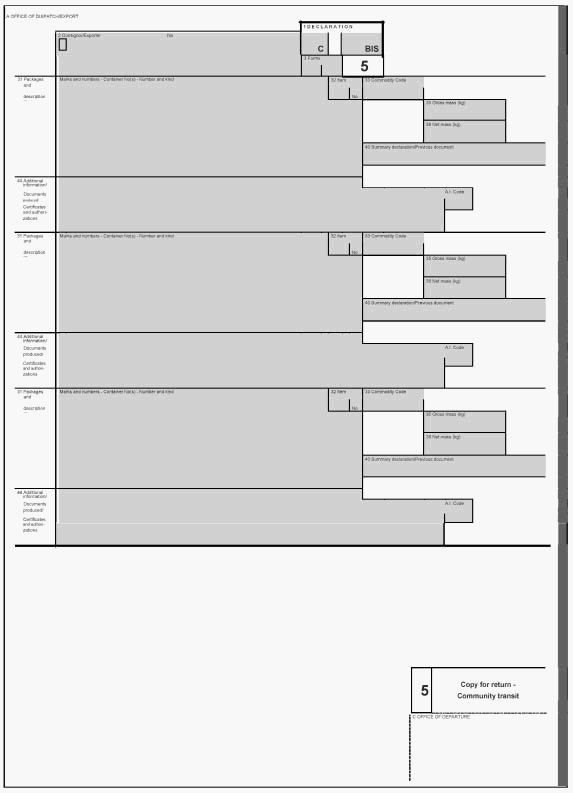
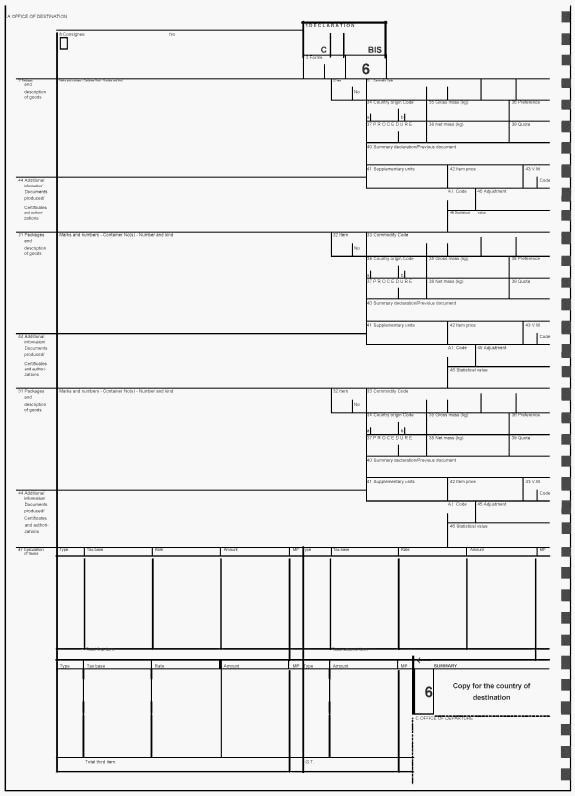
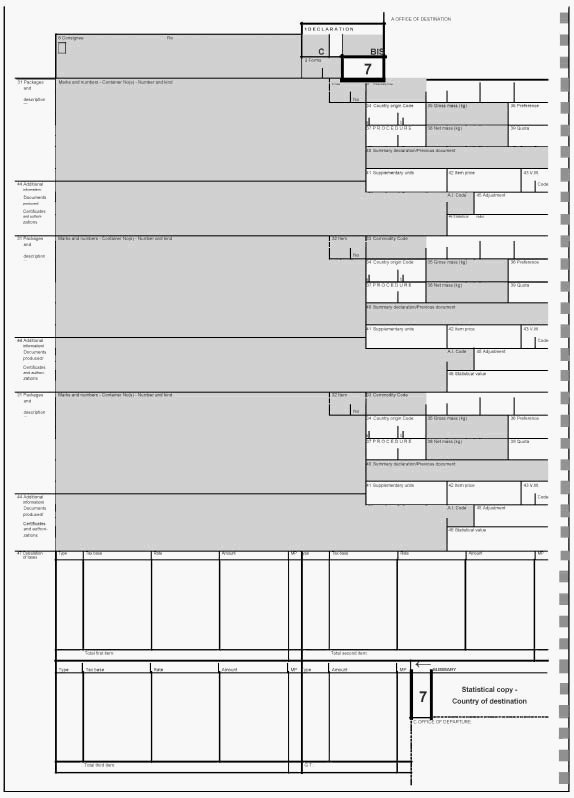
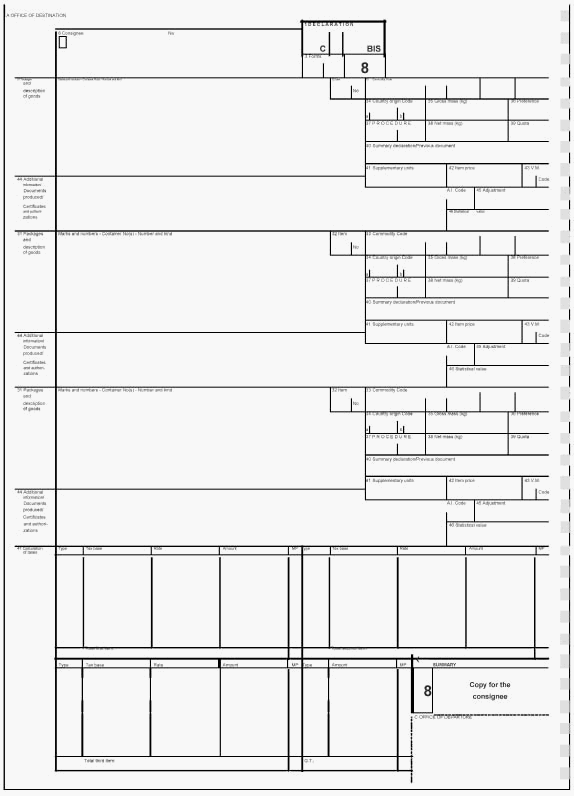
![]()
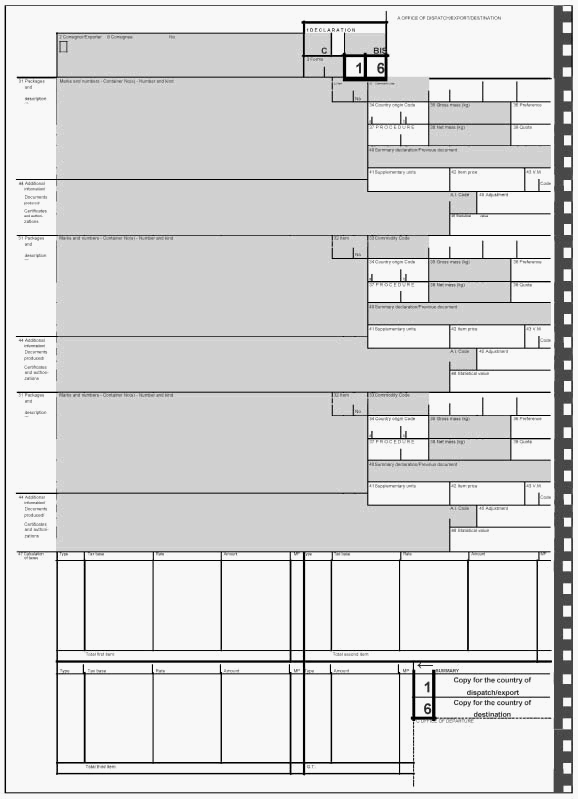


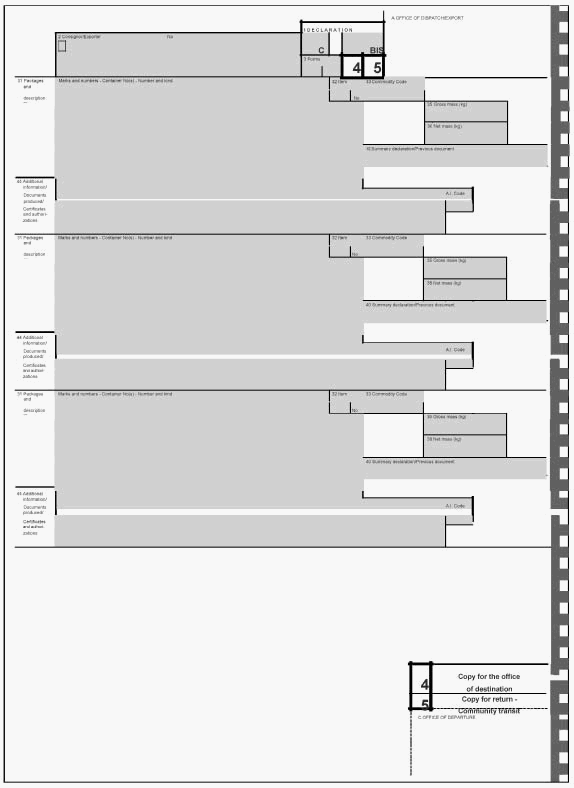
PRINT, COMPLETION AND USE OF THE SINGLE DOCUMENT
Print of the single document
Article 1
1. Without prejudice to the possibility of split use provided for in Appendix 3 to this Annex, forms for the single document shall consist of eight copies:
(a) either as a set of eight consecutive sheets, in accordance with the specimen contained in Appendix 1 to Annex I;
(b) or, particularly in the event of issue by means of a computerized system for processing declarations, of two sets of four consecutive sheets, in accordance, with the specimen contained in Appendix 2 to Annex I.
2. The single document may, if necessary, be supplemented by continuation sheets:
(a) either as a set of eight consecutive sheets, in accordance with the specimen contained in Appendix 3 to Annex I;
(b) or of two sets of four consecutive sheets, in accordance with the specimen contained in Appendix 4 to Annex I.
3. By way of derogation from paragraph 2, Contracting Parties shall have the option of not authorizing the use of continuation sheet forms in the event of use of a computerized system for processing declarations which issues such declarations.
4. Users shall be free to have forms printed, containing only those copies of the specimen in Annex I which they need for completing their declarations.
5. In the top left-hand corner of the form the Contracting Parties may print an indication identifying the Contracting Party concerned. Where such documents are presented in another Contracting Party this indication shall not prevent the declaration from being accepted.
Article 2
1. Forms shall be printed on self-copying paper dressed for writing purposes and weighing at least 40 grams per square metre. The paper must be sufficiently opaque for the information on one side not to affect the legibility of the information on the other side and its strength should be such that in normal use it does not easily tear or crease. The paper shall be white for all copies. [However, on the copies used for transit (1, 4 and 5), boxes 1 (except the middle sub-division), 2, 3, 4, 5, 6, 8, 15, 17, 18, 19, 21, 25, 27, 31, 32, 33 (first sub-division on the left), 35, 38, 40, 44, 50, 51, 52, 53, 55 and 56 have a green background.]11 The forms shall be printed in green ink.
[1a. A colour marking of the different copies of the forms shall be effected in the following manner:
(a) on forms conforming to the specimens shown in Appendices 1 and 3 of Annex I:
- copies 1, 2, 3 and 5 shall have at the right-hand edge a continuous margin coloured respectively red, green, yellow and blue,
- copies 4, 6, 7 and 8 shall have at the right-hand edge a broken margin coloured respectively blue, red, green and yellow;
(b) on forms conforming to the specimens shown in Appendices 2 and 4 of Annex I, copies 1/6, 2/7, 3/8 and 4/5 shall have at the right-hand edge a continuous margin and, to the right of this, a broken margin coloured respectively red, green, yellow and blue.
The width of these margins shall be approximately 3 millimetres. The broken margin shall comprise a series of squares with a side measurement of 3 millimetres, each one separated by 3 millimetres.]12
2. The indication of the copies on which the particulars contained in the forms must appear by a self-copying process is given in Appendix 1. An indication of the copies on which the particulars contained in the continuation sheets must appear by a self-copying process is given in Appendix 2.
3. The format of the forms shall be 210 x 297 millimetres with a maximum tolerance of 5 millimetres less and 8 millimetres more with regard to their length.
4. Contracting Parties may require that the forms must also show the name and address of the printer or a mark enabling the printer to be identified.
------------
11 Decision Nr 1/2000 of the EC-EFTA Joint Committee on simplification of formalities in trade in goods of 20 December 2000 amending Annexes II and III of the Convention on the simplification of formalities in trade in goods.
Official Journal No L 009 12/01/2001, p. 0108 - 0109
12 Decision Nr 1/89 of the EEC-EFTA Joint Committee ‘Simplification of Formalities’ of 3 May 1989 amending Annex II to the Convention on the simplification of formalities in trade in goods.
Official Journal No L 200 , 13/07/1989 p. 0003 - 0003
Completion of the single document
Article 3
1. The forms shall be completed in accordance with the explanatory note in Appendix 3.
2. When formalities are completed using public or private computer systems, the competent authorities shall authorize persons, who so request, to replace the handwritten signature with a comparable technical device, which may, where applicable, be based on the use of codes, and which has the same legal consequences as a handwritten signature. This facility shall be granted only if the technical and administrative conditions laid down by the competent authorities are met.
3. When formalities are completed using public or private computers which also print out the declarations, the competent authorities may provide for direct authentication by those systems of the declarations thus produced, in place of the manual or mechanical application of the customs office stamp and the signature of the competent official.
Use of the single document
Article 4
The provisions for the use of the single document are laid down in Appendix 3.
Article 5
1. When a single document set is used successively for completion of export, transit and/or import formalities, each person intervening in the operation shall be liable only with respect to the particulars relating to the procedure which he requested as declarant, principal or representative of the declarant or principal.
2. For the purposes of applying paragraph 1, when the person concerned uses a single document issued in an earlier phase of the trade operation in question, he shall be required, prior to lodging his declaration, to verify the accuracy of the existing particulars for the boxes for which he is responsible and their applicability to the goods in question and to the procedure requested, as well as to supplement them where necessary.
3. In the cases referred to in paragraph 2, the person concerned must immediately inform the customs service of any discrepancy established between the goods in question and the existing particulars.
Article 6
1. For the export of goods from the territory of a Contracting Party the copies 1, 2 und 3 conforming to the specimen contained in Appendix 1 to Annex I or the copies 1/6, 2/7 and 3/8 conforming to the specimen contained in Appendix 2 to Annex I shall be required.
[For transit the copies 1, 4 and 5 conforming to the specimen contained in Appendix 1 to Annex I or the copies 1/6 and 4/5 (twice) conforming to the specimen in Appendix 2 to Annex I shall be required.]13
3. For the import of goods into the territory of a Contracting Party the copies 6, 7 and 8 conforming to the specimen contained in Appendix 1 to Annex I or the copies 1/6, 2/7 and 3/8 conforming to the specimen contained in Appendix 2 to Annex I shall be required.
------------
13 Decision Nr 1/2000
Lodging of the declaration
Article 7
1. The declarations must be accompanied, within the limits laid down in Article 3 of the Convention, by the documents necessary for entry of the goods in question under the procedure applied for.
2. The lodging with a customs office of a declaration signed by the declarant or his representative shall indicate that the person concerned is declaring the goods in question for the procedure applied for and, without prejudice to the possible application of penal provisions, shall be equivalent to the engagement of responsibility, under the provisions in force in the Contracting Parties, in respect of:
- the accuracy of the information given in the declaration,
- the authenticity of the documents attached, and
- the observance of all the obligations inherent in the entry of the goods in question under the procedure concerned.
Article 8
In cases where supplementary copies of the single document or declaration are required, the persons concerned may use additional sheets or photocopies of that document or declaration for this purpose, as necessary. They shall be accepted by the competent authorities as if they were original documents provided that their quality and legibility are considered satisfactory by the authorities.
INDICATION OF THE COPIES OF THE FORMS GIVEN IN APPENDICES 1 AND 3 OF ANNEX I ON WHICH THE PARTICULARS CONTAINED THEREIN MUST APPEAR BY A SELF-COPYING PROCESS
(counting copy 1)
|
Box No |
Copies |
Box No |
Copies |
|
I. BOXES FOR COMMERCIAL OPERATIONS |
|||
|
1 |
1 to 8 |
29 |
1 to 3 |
|
except middle sub-division |
30 |
1 to 3 |
|
|
1 to 3 |
31 |
1 to 8 |
|
|
2 |
1 to 5 (1) |
32 |
1 to 8 |
|
3 |
1 to 8 |
33 |
first sub-division |
|
4 |
1 to 8 |
on the left |
|
|
5 |
1 to 8 |
1 to 8 |
|
|
6 |
1 to 8 |
remainder |
|
|
7 |
1 to 3 |
1 to 3 |
|
|
8 |
1 to 5 (1) |
34a |
1 to 3 |
|
9 |
1 to 3 |
34b |
1 to 3 |
|
10 |
1 to 3 |
35 |
1 to 8 |
|
11 |
1 to 3 |
36 |
- |
|
12 |
- |
37 |
1 to 3 |
|
13 |
1 to 3 |
38 |
1 to 8 |
|
14 |
1 to 4 |
39 |
1 to 3 |
|
15 |
1 to 8 |
40 |
1 to 5 (1) |
|
15a |
1 to 3 |
41 |
1 to 3 |
|
15b |
1 to 3 |
42 |
- |
|
16 |
1, 2, 3, 6, 7 and 8 |
43 |
- |
|
17 |
1 to 8 |
44 |
1 to 5 (1) |
|
17a |
1 to 3 |
45 |
- |
|
17b |
1 to 3 |
46 |
1 to 3 |
|
18 |
1 to 5 (1) |
47 |
1 to 3 |
|
19 |
1 to 5 (1) |
48 |
1 to 3 |
|
20 |
1 to 3 |
49 |
1 to 3 |
|
21 |
1 to 5 (1) |
50 |
1 to 8 |
|
22 |
1 to 3 |
51 |
1 to 8 |
|
23 |
1 to 3 |
52 |
1 to 8 |
|
24 |
1 to 3 |
53 |
1 to 8 |
|
25 |
1 to 5 (1) |
54 |
1 to 4 |
|
26 |
1 to 3 |
55 |
- |
|
27 |
1 to 5 (1) |
56 |
- |
|
28 |
1 to 3 |
||
|
II. ADMINISTRATIVE BOXES |
|||
|
A |
1 to 4 (2) |
F |
- |
|
B |
1 to 3 |
G |
- |
|
C |
1 to 8 (2) |
H |
- |
|
D |
1 to 4 |
I |
- |
|
E |
- |
J |
- |
----------
(1) In no case may operators be obliged to complete these boxes for transit purposes on copies 5 and 7.
(2) The country of export can choose whether these particulars appear on the copies specified.
INDICATION OF THE COPIES OF THE FORMS GIVEN IN APPENDICES 2 AND 4 OF ANNEX I ON WHICH THE PARTICULARS CONTAINED THEREIN MUST APPEAR BY A SELF-COPYING PROCESS
(counting copy 1)
|
Box No |
Copies |
Box No |
Copies |
|
I. BOXES FOR COMMERCIAL OPERATIONS |
|||
|
1 |
1 to 4 |
29 |
1 to 3 |
|
except middle sub-division |
30 |
1 to 3 |
|
|
1 to 3 |
31 |
1 to 4 |
|
|
2 |
1 to 4 |
32 |
1 to 4 |
|
3 |
1 to 4(1) |
33 |
first sub-division |
|
4 |
1 to 4 |
on the left |
|
|
5 |
1 to 4 |
1 to 4 |
|
|
6 |
1 to 4 |
remainder |
|
|
7 |
1 to 3 |
1 to 3 |
|
|
8 |
1 to 4 |
34a |
1 to 3 |
|
9 |
1 to 3 |
34b |
1 to 3 |
|
10 |
1 to 3 |
35 |
1 to 4 |
|
11 |
1 to 3 |
36 |
1 to 3 |
|
12 |
1 to 3 |
37 |
1 to 3 |
|
13 |
1 to 3 |
38 |
1 to 4 |
|
14 |
1 to 4 |
39 |
1 to 3 |
|
15 |
1 to 4 |
40 |
1 to 4 |
|
15a |
1 to 3 |
41 |
1 to 3 |
|
15b |
1 to 3 |
42 |
1 to 3 |
|
16 |
1 to 3 |
43 |
1 to 3 |
|
17 |
1 to 4 |
44 |
1 to 4 |
|
17a |
1 to 3 |
45 |
1 to 3 |
|
17b |
1 to 3 |
46 |
1 to 3 |
|
18 |
1 to 4 |
47 |
1 to 3 |
|
19 |
1 to 4 |
48 |
1 to 3 |
|
20 |
1 to 3 |
49 |
1 to 3 |
|
21 |
1 to 4 |
50 |
1 to 4 |
|
22 |
1 to 3 |
51 |
1 to 4 |
|
23 |
1 to 3 |
52 |
1 to 4 |
|
24 |
1 to 3 |
53 |
1 to 4 |
|
25 |
1 to 4 |
54 |
1 to 4 |
|
26 |
1 to 3 |
55 |
- |
|
27 |
1 to 4 |
56 |
- |
|
28 |
1 to 3 |
||
|
II. ADMINISTRATIVE BOXES |
|||
|
A |
1 to 4 (1) |
F |
- |
|
B |
1 to 3 |
G |
- |
|
C |
1 to 4 |
H |
- |
|
D/J |
1 to 4 |
I |
- |
|
E/J |
- |
||
-----------
(1) The country of export can choose whether these particulars appear on the copies specified.
EXPLANATORY NOTE ON THE USE OF SINGLE DOCUMENT FORMS
There are various possible ways of using the forms and these may be grouped under two headings:
- full use of the system,
or
- split use.
1. Full use
This refers to cases in which, at the time when the export formalities are carried out, the person concerned uses a form containing the copies needed for the formalities relating to export and to transit as well as those to be carried out in the country of destination.
The form used for this purpose contains eight copies:
- copy 1 which is to be retained by the authorities of the country of export (export and transit formalities),
- copy 2 which is to be used for statistics by the country of export,
- copy 3 which is returned to the exporter after being stamped by the customs authorities,
- copy 4 which is to be kept in a transit operation by the office of destination,
- copy 5 which is the return copy for the transit,
- copy 6 which is to be retained by the authorities of the country of destination (for import formalities),
[- copy 7 which is to be used for statistics by the country of destination (for import formalities),]14
- copy 8 which is returned to the consignee after being stamped by the customs authorities.
(Copies 2 and 7 may be used for other administrative purposes according to the requirements of the Contracting Parties).
The form is thus composed of a set of eight copies, of which the first three have to do with the formalities to be carried out in the country of export and the following five concern the formalities ot be carried out in the country of destination.
Each set of eight copies is designed in such a way that where boxes must contain identical information in the countries involved it may be entered directly by the exporter or the principal on copy 1 and will then appear, by means of a chemical treatment of the paper, on all the copies.Where, however, for any reason (for example, protection of trade secrets, content of information different as between the country of export and that of destination) information is not to be forwarded from one country to another, the desensitization of the self-copying paper restricts reproduction to the copies intended for the country of export.
If the same box is to be used but with a different content in the country of destination, carbon paper will then have to be used to reproduce these additional particulars on copies 6 to 8.
However, particularly in cases where use is made of computerized processing of declarations, it is possible to use not the set of 8 copies referred to above but two sets of four copies, in which each copy may have a dual function: 1/6, 2/7, 3/8, 4/5; the first set would then correspond, as regards the particulars to be given therein, to copies 1 to 4 above, and the second to copies 5 to 8. In this case, in each four-copy set, the numbers of the copies being used must be shown by deleting the numbers, in the margin of the form, referring to the copies not being used.
Each set of four copies thus defined is designed so that the information which has to be reproduced on the various copies will be reproduced by means of a chemical treatment of the paper.
2. Split use
This refers to cases where the person concerned does not wish to use a complete set as outlined in paragraph 1 above. He may then use
for each of the stages (export, transit or import) of an operation involving trade in goods between Contracting Parties the copies of the declaration needed to carry out the formalities relating to this stage alone. He may, in addition, attach to these copies, in so far as he wishes to, the copies needed to carry out the formalities relating to one another of the following stages of the operation.
Various different combinations are therefore possible in cases of split use, the numbers of the copies listed being the same as those already mentioned in paragraph 1 above.
By way of example, the following combinations are possible:
- export alone: copies 1, 2 and 3,
[- export + transit: copies 1, 2, 3, 4 and 5,]15
- export + import: copies 1, 2, 3, 6, 7 and 8,
[- transit alone: copies 1, 4 and 5,]16
- transit + import: copies 1, 4, 5, 6, 7 and 8,
- import alone: copies 6, 7 and 8.
In addition, there are situations in which it is essential to provide proof at destination of the Community status of the goods in question although use has not been made of transit. In such cases it will be necessary to use the copy provided for this purpose (copy No 4), either on its own or in combination with one or other of the sets described above. When under Community rules the document proving the Community status of the goods must be produced in three copies, additional copies or photocopies of copy No 4 must be produced.
--------
14 Decision Nr 1/2000
15 Decision Nr 1/2000
16 Decision Nr 1/2000
The forms concerned contain all the details which may be required by the Contracting Parties. It is compulsory for certain boxes to be filled in, whereas others have to be filled in only if requested by the country in which the formalities are completed. In this respect the section of this notice dealing with the use of the various boxes should be closely followed.
In any case, without prejudice to the application of simplified procedures, the respective maximum lists of the boxes which may be completed at each stage of a trading operation between the Contracting Parties, including those required only in the event of the application of specific legislation, are as follows:
[- export formalities: boxes 1 (first and second subdivisions), 2, 3, 4, 5, 6, 7, 8, 9, 10, 11, 13, 14, 15, 15a, 15b, 16, 17, 17a, 18, 19, 20, 21, 22, 23, 24, 25, 26, 27, 28, 29, 30, 31, 32, 33, 34a, 34b, 35, 37, 38, 39, 40, 41, 44, 46, 47, 48, 49, 50 and 54,]17
[- transit formalities: boxes 1 (third subdivision), 2, 3, 4, 5, 6, 7, 8, 15, 15a, 17, 17a, 18, 19, 21, 25, 26, 27, 30, 31, 32, 33 (first subdivision), 35, 38, 40, 44, 50, 51, 52, 53, 55 and 56,]18 19
- import formalities: boxes 1, 2, 3, 4, 5, 6, 7, 8, 9, 10, 11, 12, 13, 14, 15, 15a, 16, 17, 17a, 17b, 18, 19, 20, 21, 22, 23, 24, 25, 26, 27, 28, 29, 30, 31, 32, 33, 34a, 35, 36, 37, 38, 39, 40, 41, 42, 43, 44, 45, 46, 47, 48, 49, 54,
- proof of Community character of the goods (T2L): boxes 1 (except second sub-division), 2, 3, 4, 5, 14, 31, 32, 33, 35, 38, 40, 44, 54.
--------
17 Decision Nr 1/2006 of the EC-EFTA Joint Committee on simplification of formalities in trade in goods of 25 October 2006 amending the Convention on the simplification of formalities in trade in goods.
Official Journal No L 357 of 15/12/2006, p. 01 - 52
18 Decision Nr 1/2000
19 Decision Nr 1/2006
C. Instructions for use of the form
In all cases where the kind of set used contains at least one copy which may be used in a country other than the one in which it was first completed, the forms must be completed by typewriter or by a mechanographical or similar process. For ease of completion by typewriter the form should be inserted in the machine in such a way that the first letter of the particulars to be entered in box 2 is placed in the position box in the top left-hand corner.
Where all the copies of the set used are intended for use in the same country and provided that this option is provided for by that country they may also be filled in legibly by hand, in ink and in block capitals. The same applies with regard to the particulars to be given on the copies used for the purposes of the application of transit.
The form must contain no erasures or overwriting. Any alterations must be made by crossing out the incorrect particulars and, where appropriate, adding those required. Any alterations made in this way must be initialled by the person making them and expressly authenticated by the competent authorities. The latter may, where necessary, require a new declaration to be lodged.
In addition, the forms may be completed using an automatic reproduction process instead of any of the procedures mentioned above. They may also be produced and completed by this means provided that the provisions as regards the specimens, the paper, the size, the language used, the legibility, the prohibition of erasures and alterations and as regards amendments are strictly observed.
Only numbered boxes are, where necessary, to be completed. The other boxes, indicated by a capital letter, are reserved exclusively for internal use by the administration.
The copies which are to remain at the office of export and/or departure must bear the original signature of the persons concerned. The signature of the principal, or where applicable, of his authorized representative, commits him to all of the particulars relating to the transit operation as these result from the implementation of the relevant provisions including those described in section B above.
The copies which are to remain at the office of destination must bear the original signature of the person concerned. It should be remembered that under the export and import formalities, the signature of the person concerned is equivalent to a commitment, in accordance with the legislation in force in the Contracting Parties, to:
- the accuracy of the information given in the declaration relating to the formalities for which he is responsible,
- the authenticity of the documents attached, and
- the observance of all the obligations inherent in the entry of the goods in question under the procedure concerned.
As regards transit and import formalities it should be noted that it is in the interests of each person intervening in the operation to check the contents of his declaration. In particular, any discrepancy found by the person concerned between the goods which he must declare and the particulars already shown, if applicable, in the forms being used must immediately be notified by that person to the customs authority. In such cases the declaration must then be made on fresh forms.
Subject to Title III, where a box is not to be used, it should be left blank.
PARTICULARS TO BE ENTERED IN THE DIFFERENT BOXES
I. Formalities in the country of export
Box 1: Declaration
In the first sub-division enter the code laid down in Annex III, as applicable.
As far as the type of declaration (second sub-division) is concerned this item is optional for the Contracting Parties.
In addition, where transit is used, the appropriate symbol should be shown in the right-hand (third) sub-division of this box.
[Box 2: Exporter
Box for optional use by the Contracting Parties. Enter the full name and address of the person or company concerned. The Contracting Parties may add to the explanatory note the requirement to include a reference to the identification number allocated by the competent authorities for tax, statistical or other purposes.
In the case of groupage consignments, the Contracting Parties may provide that the word "various" be entered in this box and that the list of exporters be attached to the declaration.
In the case of transit this box is optional for the Contracting Parties.]20
Box 3: Forms
Enter the serial number of the set among the total number of sets of forms and continuation sheets used (for example, if there is one form and two continuation sheets, indicate on the form 1/3, on the first continuation sheet 2/3 and on the second continuation sheet 3/3).
When the declaration covers only one item (i.e. when only one ‘description of the goods’ box has to be completed) do not enter anything in box 3 but enter the figure 1 in box 5.
When two sets of four copies are used instead of one set of eight copies, the two sets are to be treated as one.
Box 4: Number of loading lists
Enter in figures the number of any loading lists attached or of any descriptive commercial lists authorized by the competent authority. This box is optional for the Contracting Parties for export formalities.
Box 5: Items
Enter the total number of items declared by the person concerned in the total number of forms and continuation sheets (or loading lists or commercial lists) used.The number of items must correspond to the number of ‘description of the goods’ boxes to be completed.
Box 6: Total packages
This box is optional for the Contracting Parties. Enter the total number of packages making up the consignment in question.
Box 7: Reference number
Optional item for users, to contain any reference number allocated by the person concerned to the consignment in question.
Box 8: Consignee
Enter the full name and address of the person(s) or company(ies) to whom the goods are to be delivered.
[This box is optional for the Contracting Parties as far as export formalities are concered. For transit purposes, it shall be obligatory but the Contracting Parties may allow that this box need not be completed where the consignee is established outside the territory of the Contracting Parties. The identification number need not be shown at this stage.]21
Box 9: Person responsible for financial settlement
This box is optional for the Contracting Parties (the person who is responsible for either the transfer or repatriation of the funds relating to the transaction).
Box 10: Country of first destination
This box is optional for the Contracting Parties for use in accordance with their requirements.
Box 11: Trading country
This box is optional for the Contracting Parties for use in accordance with their requirements.
Box 13: CAP
This box is optional for the Contracting Parties (information relating to the application of an agricultural policy).
[Box 14: Declarant or representative of the exporter
Box for optional use by the Contracting Parties. Enter the full name and address of the person or company concerned in accordance with the provisions in force. Where the declarant is also the exporter, enter "exporter".
The Contracting Parties may add to the explanatory note the requirement to include a reference to the identification number allocated by the competent authorities for tax, statistical or other purposes.]22
[Box 15: Country of export
Box for optional use by the Contracting Parties in the event of export formalities but compulsory when applying the transit procedure.
Enter the name of the country from which the goods are exported.
In box 15a enter the code for the country concerned.
Box 15b is for optional use by the Contracting Parties (region from which the goods are exported).
Box 15b must not be used for transit purposes.]23
Box 16: Country of origin
This box is optional for the Contracting Parties. If the declaration covers a number of items of different origin, enter the word ‘various’ in this box.
[Box 17: Country of destination
Enter the name of the country concerned. In box 17a enter the code for this country. Box 17b must not be completed at this stage in trade.
Box 17b must not be used for transit purposes.]24
Box 18: Identity and nationality of means of transport at departure
This box is optional for the Contracting Parties as far as export formalities are concerned but obligatory in the case of use of transit. Enter the identify, e.g. registration number(s) or name of the means of transport (lorry, ship, railway wagon, aircraft) on which the goods are directly loaded on presentation at the customs office where the export or transit formalities are completed, followed by the nationality of the means of transport (or that of the vehicle propelling the others if there are several means of transport) in accordance with the codes laid down for this purpose. For example, in the case of use of a tractor and trailor with different licence numbers, enter the licence number of the tractor and that of the trailer, together with the nationality of the tractor.
In the case of postal consignments or carriage by fixed transport installations, nothing should be entered in this box in respect of the registration number or nationality.
In the case of carriage by rail, the item on nationality should not be completed.
In other cases, declaration of the nationality is optional for the Contracting Parties.
Box 19: Container (Ctr)
Enter in accordance with the codes laid down in Annex III the necessary particulars with regard to the presumed situation at the border of the country of export, as known at the time of completion of the export or transit formalities.
For transit purposes this box is optional for the Contracting Parties.
Box 20: Delivery terms
This box is optional for the Contracting Parties (indication of certain terms of the commercial contract).
Box 21: Identity and nationality of the active means of transport crossing the border
This box is optional for the Contracting Parties with regard to the identity.
This box is obligatory as regards the nationality.
However, in the case of postal consignments or carriage by rail or fixed transport installation, nothing should be entered in respect of the registration number or nationality.
Enter the type (lorry, ship, railway wagon, aircraft), followed by the identity, e.g. registration number or name of the active means of transport (i.e. the propelling means of transport) which it is presumed will be used at the frontier crossing point on exit from the country of export, followed by its nationality, as known at the time of completion of the export or transit formalities, by using the appropriate code.
In the case of combined transport or if there are several means of transport, the active means of transport is the one which propels the whole combination. For example, if lorry on sea-going vessel, the active means of transport is the ship, if tractor and trailer, the active means of transport is the tractor.
Box 22: Invoice currency and total amount invoiced
This box is optional for the Contracting Parties (enter the code for the currency in which the invoice was drawn up, followed by the invoiced price for the total amount of the goods declared).
Box 23: Exchange rate
This box is optional for the Contracting Parties (exchange rate in force between the invoice currency and the currency of the country concerned).
Box 24: Nature of the transaction
This box is optional for the Contracting Parties (indicating certain terms of the commercial contract).
[Box 25: Mode of transport at the border
Use the codes in Annex III to enter the mode of transport which it is presumed will provide the active means of transport on which the goods will leave the territory of the Contracting Party of export.
Box for optional use by the Contracting Parties in the case of transit.]25.
Box 26: Mode of transport inland
This box is optional for the Contracting Parties (indicating, in accordance with the codes laid down in Annex III, the nature of the mode of transport used within the country concerned).
Box 27: Place of loading
This box is optional for the Contracting Parties. Enter, if applicable in code form, where provided for, the place of loading of the goods on to the active means of transport on which they are to cross the border of the country of export, as far as this is known at the time of completion of the export or transit formalities.
Box 28: Financial and banking data
This box is optional for the Contracting Parties (transfer of funds relating to the operation in question - information on financial formalities and procedure and on bank references).
[Box 29: Office of exit
Box for optional use by the Contracting Parties (enter the customs office by which it is intended that the goods should leave the territory of the Contracting Party concerned)]26.
Box 30: Location of the goods
This box is optional for the Contracting Parties (indicating the precise location where the goods may be examined).
Box 31: Packages and description of goods - Marks and numbers - Container No(s) - Number and kind
[Enter the marks, numbers, number and kind of packages or, in the case of unpackaged goods, the number of such goods covered by the declaration, or the word "bulk", as appropriate ; the normal trade description must be entered in all cases ; for export purposes this description must comprise the particulars necessary to identify the goods. Where box 33 "Commodity Code" must be completed, this description must be expressed in sufficiently precise terms to allow classification of the goods. This box must also show the particulars required by any specific rules (excise duties, etc.) . If containers are used, the identifying marks of the containers should also be entered in this box.]27
When the person concerned has entered the word ‘various’ in box 16, the Contracting Parties may request that the name of the country of origin of the goods in question be entered in this box, but cannot make it obligatory.
Box 32: Item number
Enter the number of the item in question in relation to the total number of articles declared in the forms used, as defined in the note to box 5
When the declaration covers only one item of goods, the Contracting Parties need not require this box to be completed, the figure 1 having been entered in box 5.
[Box 33: Commodity code
Enter the code number corresponding to the item in question.
For the purposes of transit and proving the Community status of the goods this box is optional for the Contracting Parties, except in cases where the Convention on a common transit procedure of 20 May 1987 specifies that its use is obligatory.]28
Box 34: Code, country of origin
This box is optional for the Contracting Parties:
- box 34a (code corresponding to the country given in box 16. When the word ‘various’ is given in box 16, enter the code corresponding to the country of origin of the item in question),
- box 34b (region of production of the goods in question).
Box 35: Gross mass
This box is optional for the Contracting Parties as far as export formalities are concerned but obligatory in the case of transit. Enter the gross mass of the goods described in the corresponding box 31, expressed in kilograms. The gross mass is the aggregated mass of the goods with all their packing, excluding containers and other transport equipment.
Box 37: Procedure
Enter, in accordance with the codes laid down for this purpose, the procedure for which the goods are declared on export.
Box 38: Net mass
Enter the net mass of the goods described in the corresponding box 31, expressed in kilograms. The net mass is the mass of the goods themselves without any packaging.
As far as transit is concerned this box is optional for the Contracting Parties.
Box 39: Quota
This box is optional for the Contracting Parties (where necessary for the application of quota legislation).
Box 40: Summary declaration/previous document
This box is optional for the Contracting Parties (references of documents relating to the administrative procedure preceding export to another country).
[For the purposes of transit and proving the Community status of the goods this box is optional for the Contracting Parties, except in cases where the Convention on a common transit procedure of 20 May 1987 specifies that its use is obligatory.]29
Box 41: Supplementary units
For use as necessary in accordance with the goods nomenclature. Enter the quantity of the item in question, expressed in the unit laid down in the goods nomenclature.
Box 44: Additional information, documents produced, certificates and authorizations
Enter the details required by any specific regulations applicable in the country of export, together with the references of the documents produced in support of the declaration. (This may include serial Nos of Control Copies T5, No of export licence/permit; data concerning veterinary and phytosanitary regulations; bill of lading No etc.). In the sub-division ‘Additional information (A.1) code’, enter as necessary the code number, provided for this purpose for the additional information which may be required for transit purposes. This sub-division must not be used until a computerized system for discharging transit operations comes into effect.
Box 46: Statistical value
Enter the amount, expressed in the currency stipulated by the Contracting Party of the statistical value in accordance with the provisions in force.
Box 47: Calculation of taxes
The Contracting Parties may require the following to be shown, where appropriate, on each line, using the relevant codes laid down for this purpose:
- the type of tax (export duties),
- the tax base,
- the rate of tax applicable,
- the amount of the tax thus calculated,
- the method of payment chosen (MP).
Box 48: Deferred payment
This box is optional for the Contracting Parties (reference to the authorization in question).
Box 49: Identification of warehouse
This box is optional for the Contracting Parties.
[Box 50: Principal and authorised representative, place, date and signature
Enter the full name (person or company) and address of the principal, together with the identification number, if any, allocated by the competent authorities. Where appropriate, enter the full name (person or company) of the authorised representative signing on behalf of the principal.
Subject to specific provisions to be adopted with regard to the use of computerised systems, the original of the handwritten signature of the person concerned must figure on the copy which is to remain at the office of departure. Where the person concerned is a legal person, the signatory should add after his signature his full name and the capacity in which he is signing.
For export operations, the declarant or his representative may enter the name and address of a person established in the district of the office of exit to whom Copy No 3 of the declaration endorsed by the said office may be given.]30
[Box 51: Intended offices of transit (and countries)
Enter the intended office of entry into each Contracting Party whose territory is to be transited in the course of carriage or, where the operation involves transiting territory other than that of the Contracting Parties, the office of exit by which the means of transport will leave their territory. Note that the transit offices appear in the list of offices competent for transit operations. Enter the code for the country concerned.]31.
After the name of the office, enter the code relating to the country concerned.
Box 52: Guarantee
Enter any appropriate information relating to the type of guarantee used for the operation concerned.
Box 53: Office of destination (and country)
Enter the name of the office where the goods are to be presented in order to complete the transit operation. The offices of destination are listed in the ‘list of customs offices competent for transit operations’.
After the name of the office, enter the code relating to the country concerned.
Box 54: Place and date, signature and name of the declarant or his representative
Subject to specific provisions to be adopted with regard to the use of computerized systems, the original of the handwritten signature of the person concerned must be given on the copy which is to remain at the office of departure followed by the full name of that person. When the person concerned is a legal person, the signatory should add his status after his signature and name, if so required by the Contracting Parties.
---------
20 Decision Nr 1/2006
21 Decision Nr 1/89
22 Decision Nr 1/89
23 Decision Nr 1/2006
24 Decision Nr 1/2006
25 Decision Nr 1/2006
26 Decision Nr 1/2006
27 Decision Nr 1/89
28 Decision Nr 1/2000
29 Decision Nr 1/2000
30 Decision Nr 1/2006
31 Decision Nr 1/2006
Between the time when the goods leave the office of export and/or departure, and the time when they arrive at the office of destination, it is possible that certain details may need to be added on the copies of the single document which accompany the goods. These details concern the transport operation and must be added to the document by the carrier responsible for the means of transport on which the goods are directly loaded, as and when the transport operations take place. These particulars may be added legibly by hand; in this case, the form should be completed in ink and in block capitals.
These details concern the following boxes only (copies 4 and 5):
- Transhipment: use box 55 Box 55 (transhipments):
[Box to be used in accordance with the provisions of the Convention on a common transit procedure of 20 May 1987.]32
- Other incidents: use box 56
Box 56 (other incidents during carriage):
Box to be completed in accordance with existing obligations for transit.
In addition, when the goods were loaded on a semi-trailer and only the tractor vehicle is changed during the journey (without the goods being handled or transhipped) enter in this box the registration number and the nationality of the new tractor. In such cases, certification by the competent authorities is not necessary.
---------
32 Decision Nr 1/2000
III. Formalities in the country of destination
Box 1: Declaration
Enter the codes laid down in Annex III as applicable.
As far as the type of declaration (second subdivision) is concerned, this item is optional for the Contracting Parties.
The right- hand (third) subdivision must not be used for import formalities.
Box 2: Exporter
This box is optional for the Contracting Parties. Enter the full name and address of the exporter or seller of the goods.
Box 3: Forms
Enter the serial number of the set among the total number of sets of forms and continuation sheets used (for example, if there are one form and two continuation sheets, indicate on the form 1/3, on the first continuation sheet 2/3 and on the second continuation sheet 3/3)
When the declaration covers only one item (i. e. when only one ‘description of the goods’ box has to be completed) do not enter anything in box 3 but enter the figure 1 in box 5.
Box 4: Number of loading lists
This box is optional for the Contracting Parties.
Enter in figures the number of any loading lists attached, or of descriptive commercial lists where these are authorized by the competent authority.
Box 5: Items
Enter the total number of items declared by the person concerned in the total number of forms and continuation sheets (or loading lists or commercial lists) used. The number of items must correspond to the number of ‘description of the goods’ boxes to be completed.
Box 6: Total packages
This box is optional for the Contracting Parties. Enter the total number of packages making up the consignment in question.
Box 7: Reference number
Optional item for users, to contain the reference number allocated by the person concerned to the consignment in question.
[Box 8: Consignee
Box for optional use by the Contracting Parties. Enter the full name and address of the person or company concerned. In the case of groupage consignments, the Contracting Parties may provide that the word "various" be entered in this box, and the list of consignees attached to the declaration. The Contracting Parties may add to the explanatory note the requirement to include a reference to the identification number allocated by the competent authorities for tax, statistical or other purposes.]33.
Box 9: Person responsible for financial settlement
This box is optional for the Contracting Parties (the person who is responsible for either the transfer or repatriation of the funds relating to the transaction).
Box 10: Country of last consignment
This box is optional for the Contracting Parties for use in accordance with their requirements.
Box 11: Trading country/country of production
This box is optional for the Contracting Parties for use in accordance with their requirements.
Box 12: Value details
This box is optional for the Contracting Parties (details necessary for determining the dutiable, statistical or taxable value).
Box 13: CAP
This box is optional for the Contracting Parties (information relating to the application of an agricultural policy).
[Box 14: Declarant or representative of the consignee
Box for optional use by the Contracting Parties. Enter the full name and address of the person or company concerned in accordance with the provisions in force. Where the declarant is also the consignee, enter "consignee". The Contracting Parties may add to the explanatory note the requirement to include a reference to the identification number allocated by the competent authorities for tax, statistical or other purposes.]34
Box 15: Country of export
This box is optional for the Contracting Parties. Enter the name of the country from which the goods were exported. In box 15a enter the code for the country concerned.
Box 15b must not be used.
Box 16: Country of origin
This box is optional for the Contracting Parties. If the declaration covers a number of items of different origin, enter the word ‘various’ in this box.
Box 17: Country of destination
This box is optional for the Contracting Parties. Enter the name of the country concerned.
In Box 17a enter the code for the country concerned.
In Box 17b enter the region of destination of the goods.
Box 18: Identity and nationality of means of transport on arrival
This box is optional for the Contracting Parties. Enter the identity, e. g. registration number(s) or name of the means of transport (lorry, ship, railway wagon, aircraft) on which the goods were directly loaded on presentation at the customs office where the import formalities are completed, followed by the nationality of the means of transport (or that of the vehicle propelling the others if there are several means of transport) according to the codes laid down for this purpose. For example, in the case of use of a tractor and trailer with different licence numbers, enter the licence number of the tractor and that of the trailer, together with the nationality of the tractor.
In the case of postal consignments or carriage by fixed transport installation nothing should be entered in this box in respect of the registration number or nationality.
In the case of carriage by rail nothing should be entered in respect of the nationality.
Box 19: Container (Ctr)
Enter the necessary particulars in accordance with the codes laid down in Annex III.
Box 20: Delivery terms
This box is optional for the Contracting Parties (indication of certain terms of the commercial contract).
Box 21: Identity and nationality of the active means of transport crossing the border
This box is optional for the Contracting Parties with regard to identity. This box is obligatory as regards the nationality.
However, in the case of postal consignments or carriage by rail or fixed transport installation nothing should be entered in respect of the registration number or nationality.
Enter the type (for example, lorry, ship, railway wagon, aircraft), followed by the identity, e.g. registration number or name of the active means of transport (i.e. the propelling means of transport) used at the frontier crossing point on entry into the country of destination, followed by its nationality, by using the appropriate code.
In the case of combined transport or if there are several means of transport, the active means of transport is the one which propels the whole combination. For example, if lorry on sea-going vessel, the active means of transport is the ship, if tractor and trailer, the active means of transport is the tractor.
Box 22: Invoice currency and total amount invoiced
This box is optional for the Contracting Parties (enter the code for the currency in which the invoice was drawn up, followed by the invoiced price for the total amount of the goods declare
Box 23: Exchange rate
This box is optional for the Contracting Parties (exchange rate in force between the invoice currency and the currency of the country concerned).
Box 24: Nature of the transaction
This box is optional for the Contracting Parties (indicating certain terms of the commercial contract).
[Box 25: Mode of transport at the border
Use the codes in Annex III to enter the mode of transport which provided the active means of transport on which the goods entered the territory of the Contracting Party of destination]35.
Box 26: Mode of transport inland
This box is optional for the Contracting Parties (indication, in accordance with the codes laid down in Annex III, of the mode of transport used within the country concerned).
Box 27: Place of unloading
This box is optional for the Contracting Parties. Enter, if applicable in code form, where provided for, the place where the goods are unloaded from the active means of transport on which they crossed the border of the country of destination.
Box 28: Financial and banking data
This box is optional for the Contracting Parties (transfer of funds relating to the operation in question - information on financial formalities and procedure and on bank references).
[Box 29: Office of entry
Box for optional use by the Contracting Parties (enter the customs office by which the goods entered the territory of the Contracting Party concerned).]36
Box 30: Location of the goods
This box is optional for the Contracting Parties (indicating the precise location where the goods may be examined).
Box 31: Packages and description of goods - Marks and numbers - Container No(s) - Number and kind
Enter the marks, numbers, quantity and kind of packages or, in the case of unpackaged goods, enter the number of such goods covered by the declaration, or the word ‘bulk’, as appropriate, together with the particulars necessary to identify the goods. The description of the goods means the normal trade description expressed in sufficiently precise terms to enable immediate and unambiguous identification and classification. This box must also show the particulars required by any specific rules (such as VAT or excise duties). If containers are used, the identifying marks of the container should also be entered in this box.
When the person concerned has entered the word ‘various’ in box 16, (country of origin), the Contracting Parties may require the indication here of the name of the country of origin of the goods in question.
Box 32: Item number
Enter the number of the item in question in relation to the total number of articles declared in the forms used, as defined in the note to box 5.
When the declaration covers only one item of goods, the Contracting Parties need not require this box to be completed, the figure 1 having been entered in box 5.
Box 33: Commodity code
Enter the code number corresponding to the item in question. In the second and following sub-divisions the Contracting Parties may provide for use of a nomenclature for specific purposes.
[Box 34: Code, country of origin
Box for optional use by the Contracting Parties (enter in box 34a the code for the country of origin, if any, mentioned in box 16). When the word "various" is given in box 16, enter the code corresponding to the country of origin of the item in question (do not complete box 34b).]37
Box 35: Gross mass
This box is optional for the Contracting Parties. Enter the gross mass of the goods described in the corresponding box 31, expressed in kilograms. The gross mass is the aggregated mass of the goods with all their packing, excluding containers and other transport equipment.
Box 36: Preference
This box is optional for the Contracting Parties (reference to any preferential rate of duty which should be applied).
Box 37: Procedure
Enter the procedure for which the goods are declared at destination in accordance with the codes laid down for this purpose.
Box 38: Net mass
Enter the net mass of the goods described in the corresponding box 31, expressed in kilograms. The net mass is the mass of the goods themselves without any packaging.
Box 39: Quota
This box is optional for the Contracting Parties (where necessary for the application of quota legislation).
Box 40: Summary declaration/previous document
This box is optional for the Contracting Parties (reference of any summary declaration used in the country of destination or of the documents relating to any previous administrative procedure).
Box 41: Supplementary units
For use as necessary in accordance with the goods nomenclature. Enter the quantity of the item in question, expressed in the unit laid down in the goods nomenclature.
[Box 42: Item price
Box for optional use by the Contracting Parties (enter the amount included in any price entered in box 22 which relates to the item in question).]38
Box 43: Valuation method
This box is optional for the Contracting Parties (details necessary for determining the dutiable, statistical or taxable value).
Box 44: Additional information, documents produced, certificates and authorizations
Enter the details required by any specific regulations applicable in the country of destination together with the references of the documents produced in support of the declaration. (This may include Serial Nos of Control Copies T5; No of import licence/permit; data concerning veterinary and phytosanitary regulations; bill of lading No). The sub-division ‘Additional information (A. I.) code’ must not be used.
Box 45: Adjustment
This box is optional for the Contracting Parties (details necessary for determining the dutiable, statistical or taxable value).
Box 46: Statistical value
Enter the amount, expressed in the currency stipulated by the country of destination, of the statistical value in accordance with the provisions in force.
Box 47: Calculation of taxes
The Contracting Parties may require the following to be shown, where appropriate, on each line, using the relevant codes laid down for this purpose:
- the type of tax (import duties),
- the tax base,
- the rate of tax applicable,
- the amount of the tax thus calculated,
- the method of payment chosen (MP).
Box 48: Deferred payment
This box is optional for the Contracting Parties (reference to the authorization in question).
Box 49: Identification of warehouse
This box is optional for the Contracting Parties.
Box 54: Place and date, signature and name of the declarant or his representative
Subject to specific provisions to be adopted with regard to the use of computerized systems, the original of the handwritten signature of the person concerned must be given on the copy which is to remain at the office of destination followed by the full name of that person. When the person concerned is a legal person, the signatory should, if so required by the Contracting Parties, add his status after his signature and name.
---------
33 Decision Nr 1/2006
34 Decision Nr 1/2006
35 Decision Nr 1/2006
36 Decision Nr 1/2006
37 Decision Nr 1/2006
38 Decision Nr 1/2006
REMARKS CONCERNING THE CONTINUATION SHEETS
A. Continuation sheets should only be used if the declaration covers more than one item (see box 5).They must be presented together with a form.
B. The remarks set out in Titles I and II above apply also to the continuation sheets.
However:
- Box 2/8 is for optional use by the Contracting Parties and should show only the name and identification number, if any, of the person concerned,
- the ‘summary’ part of box 47 concerns the final summary of all the items covered by the forms used. It should therefore be used only on the last of the continuation sheets attached to a single document form in order to show the total per type of tax and the grand total (GT) of the charges payable.
C. If continuation sheets are used, the boxes ‘description of goods’ which have not been used must be crossed through to prevent any subsequent use.
CODES TO BE USED IN THE SINGLE DOCUMENT
Box 1: Declaration
First sub-division:
The symbol EU must be used for:
- declaration for export to another Contracting Party,
- declaration for import from another Contracting Party.
Third sub-division:
This sub-division must be completed only when the form is to be used for transit purposes.
Box 19: Container
The codes applicable are given below:
0: goods not transported in containers,
1: goods transported in containers.
Box 25: Mode of transport at the border
The list of codes applicable is given below:
Code for modes of transport, post and other consignments
A. 1-figure code (obligatory).
B. 2-figure code (2nd digit optional for the Contracting Parties)
|
A |
B |
Denomination |
|
1 |
10 |
Sea transport |
|
12 |
Railway wagon on sea-going vessel |
|
|
16 |
Powered road vehicle on sea-going |
|
|
vessel |
||
|
17 |
Trailer or semi-trailer on sea-going |
|
|
vessel |
||
|
18 |
Inland waterway vessel on sea- |
|
|
going vessel |
||
|
2 |
20 |
Rail transport |
|
23 |
Road vehicle on rail-wagon |
|
|
3 |
30 |
Road transport |
|
4 |
40 |
Air transport |
|
5 |
50 |
|
|
7 |
70 |
Fixed transport installations |
|
8 |
80 |
Inland waterway transport |
|
9 |
90 |
Own propulsion |
Box 26: Inland mode of transport
The codes adopted for box 25 are applicable.
Box 33: Commodity code
[First sub-division:
In the Community indicate the eight digits of the Combined Nomenclature. In the EFTA countries indicate in the left-hand side of this sub-division the six digits of the Harmonised Commodity Description and Coding System.
For transit purposes, where required by the Convention on a common transit procedure of 20 May 1987, indicate the code of at least six digits from the Harmonised Commodity Description and Coding System.]39
Other sub-divisions
To be completed in accordance with any other specific codes of the Contracting Parties (this should be indicated starting immediately after the first sub-division).
---------
39 Decision Nr 1/2000